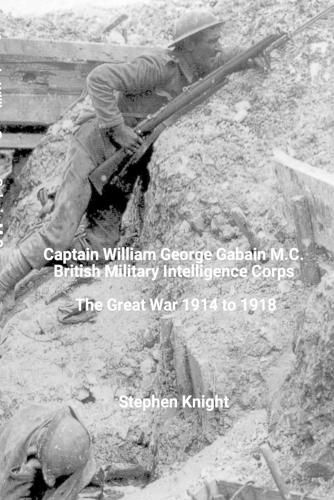Readings Newsletter
Become a Readings Member to make your shopping experience even easier.
Sign in or sign up for free!
You’re not far away from qualifying for FREE standard shipping within Australia
You’ve qualified for FREE standard shipping within Australia
The cart is loading…






This title is printed to order. This book may have been self-published. If so, we cannot guarantee the quality of the content. In the main most books will have gone through the editing process however some may not. We therefore suggest that you be aware of this before ordering this book. If in doubt check either the author or publisher’s details as we are unable to accept any returns unless they are faulty. Please contact us if you have any questions.
The Great War broke out on August 4th, 1914, impacting the lives of millions around the world. Many people thought - or hoped - that the War would be short. One of the young men who entered the fighting that month, and who served until his death in March 1918, was twenty-five year old William George Gabain M.C. Known to family to this day, as "Uncle Willie," he lost his life early in Germany's last offensive, Operation Michael, in March 1918, and is buried in the British cemetery at Pargny, France by the Somme Canal. Gabain was born in Le Havre. He traveled and studied in Germany and also read German language at Cambridge. Because of this background and fluency in French and German, he was valued as an intelligence officer. In 1915, he operated a train watching service in German occupied Belgium. In France he spent his time at GHQ, served in the 1916 Battle of the Somme and at Ypres in Belgium. He questioned prisoners, studied the terrain, flew over the trenches, translated captured documents and letters, listened to German wireless communications, and reported to GHQ and General Haig. His best friend was his Triumph motorcycle. He was educated at Sandroyd, Charterhouse and Cambridge's Pembroke College. He loved sports, especially boxing. He was survived by his parents, Charles Edward Gabain and Elizabeth Hutton Gabain, and his sisters Marjorie, Dorothy, Ruth, Nora, and Ethel. In 1921, his grief stricken mother privately published a book with excerpts from his journals, his letters, her thoughts and feelings, and condolences the family received from people who knew and served with him. His story is one of millions of men and their families who suffered and lost so much in The Great War.
$9.00 standard shipping within Australia
FREE standard shipping within Australia for orders over $100.00
Express & International shipping calculated at checkout
This title is printed to order. This book may have been self-published. If so, we cannot guarantee the quality of the content. In the main most books will have gone through the editing process however some may not. We therefore suggest that you be aware of this before ordering this book. If in doubt check either the author or publisher’s details as we are unable to accept any returns unless they are faulty. Please contact us if you have any questions.
The Great War broke out on August 4th, 1914, impacting the lives of millions around the world. Many people thought - or hoped - that the War would be short. One of the young men who entered the fighting that month, and who served until his death in March 1918, was twenty-five year old William George Gabain M.C. Known to family to this day, as "Uncle Willie," he lost his life early in Germany's last offensive, Operation Michael, in March 1918, and is buried in the British cemetery at Pargny, France by the Somme Canal. Gabain was born in Le Havre. He traveled and studied in Germany and also read German language at Cambridge. Because of this background and fluency in French and German, he was valued as an intelligence officer. In 1915, he operated a train watching service in German occupied Belgium. In France he spent his time at GHQ, served in the 1916 Battle of the Somme and at Ypres in Belgium. He questioned prisoners, studied the terrain, flew over the trenches, translated captured documents and letters, listened to German wireless communications, and reported to GHQ and General Haig. His best friend was his Triumph motorcycle. He was educated at Sandroyd, Charterhouse and Cambridge's Pembroke College. He loved sports, especially boxing. He was survived by his parents, Charles Edward Gabain and Elizabeth Hutton Gabain, and his sisters Marjorie, Dorothy, Ruth, Nora, and Ethel. In 1921, his grief stricken mother privately published a book with excerpts from his journals, his letters, her thoughts and feelings, and condolences the family received from people who knew and served with him. His story is one of millions of men and their families who suffered and lost so much in The Great War.